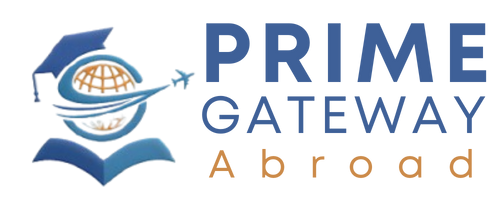- +91 9610217555
- Info@primegatewayabroad.com
- Mon - Sun: 10:00 am to 7:00 pm
Why Study in USA

Why Study in USA
The United States is the world’s most popular destination for studying abroad, with over 1 million international students.
- High-Quality Education: With over 5,300 universities, the US offers top-ranked institutions and diverse academic programs.
- Cultural Diversity: The US is home to people from all over the world, offering international students a rich cultural experience.
- Global Recognition: US degrees are respected worldwide and recognized for their high academic standards.
- Research Opportunities: The US leads in innovation, providing students with chances to work on cutting-edge research projects.
- Career Prospects: US universities have strong industry connections, offering students access to job opportunities and internships.
- Research and Innovation: If you’re interested in cutting-edge research, the U.S. is known for its investment in science, technology, and innovation
US Education System
The US education system is unique and attracts students globally. It offers a variety of programs with a focus on problem-solving, providing flexibility and diverse learning opportunities.Types of Qualifications in the US
Program Type | Duration |
Bachelor’s Degrees | 4 years |
Master’s Degrees | 1.5 – 2 years |
PhD Programs | 4 – 7 years |
Associate’s Degrees | 2 years |
Certificate Programs | 1 year |
Top Universities in the USA (2025)
The United States remains one of the most popular study destinations, attracting over a million international students each year. Here are some of the top universities in the US for 2025:
Rank | University | Global Rank |
1 | Massachusetts Institute of Technology (MIT) | 1 |
2 | Harvard University | 4 |
3 | Stanford University | 6 |
|
|
|
4 | University of California, Berkeley (UCB) | 12 |
5 | University of Chicago | 21 |
6 | University of Pennsylvania | 11 |
7 | Cornell University | 16 |
8 | California Institute of Technology (Caltech) | 10 |
9 | Yale University | 23 |
10 | Princeton University | 22 |
Popular Courses for International Students in the USA
The US offers a wide range of academic programs that attract international students. Here are some of the most popular courses:
- Business Administration (MBA)
- Engineering (Electrical, Mechanical, Civil, Computer)
- Computer Science & IT
- Health Sciences (Medicine, Nursing, Public Health)
- Social Sciences (Psychology, Sociology, Political Science)
- Arts & Humanities (Literature, History, Philosophy)
- Law
- Education
- Environmental Science
- Hospitality and Tourism Management
Types of US Student Visas
- F Visa – For academic degree students at accredited US universities.
- F-1: Full-time students
- F-2: Dependents of F-1 holders
- F-3: Mexican/Canadian “border commuters”
- M Visa – For non-academic or vocational studies.
- M-1: Vocational students
- M-2: Dependents of M-1 holders
- M-3: Mexican/Canadian vocational “border commuters”
- J Visa – For exchange program participants.
- J-1: Exchange students
- J-2: Dependents of J-1 holders
Intakes in the USA
The USA is a top choice for international students, with universities offering three main intakes each year:
- Fall Intake (September – December)
- Offers the widest range of programs
- Perfect for those who are ready to start their studies in the fall
- High acceptance rate in many US universities (99%)
- Spring Intake (January – April)
- Ideal for students who missed the Fall intake
- Higher chances of admission due to less competition
- Summer Intake (May – August)
- The last intake of the academic year
- Smaller batch sizes for more focused and personalized attention
To pursue higher Tests Required to Study in the USA with Minimum Eligibility Scores
To pursue higher education in the USA, international students are required to take various standardized tests. The minimum scores needed vary depending on the university and program chosen. Here’s a list of common tests with their minimum eligibility scores:
Test | Minimum Eligibility Score |
TOEFL | 80–100 (varies by university and program) |
IELTS | 6.0–7.0 (varies by university and program) |
GRE | 300–320 (varies by program and university) |
GMAT | 550–600 (for MBA programs, higher for top schools) |
SAT | 1050–1200 (varies by university, higher for top schools) |
ACT | 20–24 (varies by university, higher for selective schools) |
Tuition Fees and Cost of Living in USA
Studying in the USA can be expensive, mainly due to high tuition fees. Costs vary depending on the university’s location, reputation, and the program. Prestigious universities and major cities tend to be more expensive.
Average Tuition Fee Range for Studying in the USA (in USD)
Program | Tuition Fee Range (in USD) |
Bachelors | $20,000 – $50,000 |
Masters | $25,000 – $70,000 |
MBA | $45,000 – $80,000 |
PhD | $30,000 – $90,000 |
Note: These fees are approximate and can vary depending on the university, program, and location.
Costs can vary by field of study, location, and institution, so it’s important for students to research the specific schools and programs they’re interested in.
Cost of Living in the USA
For international students, professionals, or anyone moving to the USA, budgeting for living expenses is essential. On average, the cost of living in the USA ranges from $2,500 to $3,500 per month. This includes expenses such as food, housing, transportation, healthcare, taxes, and miscellaneous costs. However, the cost can vary significantly depending on the city or state.
Living Expenses | Average Annual Cost |
Apartment housing (including utilities) | $17,200 – $21,710 |
Food | $6,500 |
Dormitory housing | $7,588 – $11,914 |
Transportation | $2,180 |
Books and study materials | $500 – $1,000 |
Traveling | $500 – $1,200 |
Clothes and footwear | $500 |
Miscellaneous Expenses | $6,700 |
Keep in mind that these costs can vary depending on lifestyle and location.
Scholarships:
Studying at a US university can be expensive, with tuition fees ranging from $8,000 to $55,000 per year, depending on the university, program, and location.
In addition to tuition, living expenses, books, and other costs can add up quickly, making it hard to manage the finances. Thankfully, scholarships can help. Many universities offer merit-based scholarships for students with strong academic or extracurricular achievements, as well as need-based scholarships for those facing financial difficulties.
Scholarship | Max Grant (in USD) |
Inlaks Scholarship | $100,000 |
Ritchie-Jennings Memorial Scholarship | $10,000 |
Yale University Scholarships | $70,000 |
Clark Global Scholarship Program | $25,000 |
Boston University Presidential Scholarship | $30,000 |
Documents Required for USA Student Visa
- Original academic transcripts and certificates from previous degree studies
- Standardized and English proficiency test scores (GRE/GMAT/TOEFL, IELTS, iTEP, or PTE Academic)
- Statement of purpose
- Research proposal or essay (if required)
- Letters of recommendation
- Copy of a valid passport
- Proof of finances (bank statement from the last 3 years)
- A valid passport with at least six months of validity beyond the planned stay
- A printed copy of DS-160 (online application form)
- Fee receipt for SEVIS
- Interview appointment letter (original and copy)
- Form I-20 sent by the US university
- Visa fee payment confirmation receipt
- Original mark sheets/provisional certificates
Par Time Job:
International students on an F-1 visa can work up to 20 hours per week during the semester and full-time (40 hours) during breaks on-campus. Off-campus work requires prior approval through Optional Practical Training (OPT) or Curricular Practical Training (CPT) after one year of study. On-campus jobs, like those in libraries or dining halls, are the most accessible and do not need special permission. After completing one year, students can apply for off-campus work related to their studies. Income from part-time jobs typically ranges from $7.25 to $15 per hour but should not be relied upon to cover all living expenses.
Post Study Work:
International students in the USA usually enter on an F-1 visa, which allows part-time on-campus work (20 hours/week) during semesters and full-time (40 hours/week) during breaks. After the first year, they may be eligible for off-campus work through Curricular Practical Training (CPT) or Optional Practical Training (OPT), both requiring USCIS approval. Work must relate to their field of study.
Jobs in the USA
Studying in the USA offers excellent career prospects, especially from top universities, which boast a placement rate of 92% or higher within six months of graduation. However, the placement rate can vary depending on the industry, location, and qualifications.
The average annual salary for a graduate in the USA ranges from $60,000 to $65,000 (approx. £48,000 – £52,000). Here’s a breakdown of high-demand sectors with good salary prospects:
- Technology: Avg Salary: £8,000/month
The USA leads in tech innovation, creating a high demand for professionals in software development, cyber security, data science, and AI. - Healthcare: Avg Salary: £3,500/month
with an aging population and focus on preventive care, there is a growing need for skilled professionals, including doctors and nurses. - Engineering: Avg Salary: £5,400/month
The demand for engineers in civil, electrical, mechanical, and aerospace fields remains high across multiple industries. - Business: Avg Salary: £6,500/month
As a global commerce hub, the USA offers opportunities in finance, accounting, marketing, and international trade.
Our Support:
After students go abroad, Yuva Overseas can continue to offer valuable support:
- Post-Arrival Assistance: We help students settle into their new environment by providing essential information on local transportation, accommodation, and orientation to their new country.
- University Support: Yuva Overseas assists students in adapting to university life, understanding academic systems, and connecting with university services or academic advisors.
- Visa Extensions and Work Permits: We guide students through the process of extending their visas, applying for work permits (like OPT or CPT in the USA), or handling any legal documentation related to their stay.
- Career Support: We help with internship placements, job opportunities, and career guidance during their studies and after graduation.
- Networking and Alumni Connections: Yuva Overseas organizes networking events and connects students with alumni for mentorship and career advice.
- Ongoing Consultation: Our team is always available to assist with any issues related to accommodation, work, or any other concerns during their time abroad.
With Yuva Overseas, students receive comprehensive support throughout their international journey.
